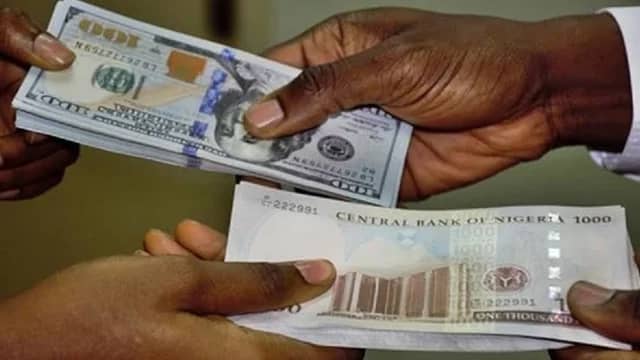Naira exchanges N950/$ at parallel market, set to gain more
After exchanging at N1350/$, the Naira has started recovering at a higher speed amid reports that the CBN is poised to fulfill its forward FX obligation.
According to some media report, the CBN is set to fulfill 75–80% of the outstanding matured foreign exchange forwards via certain Nigerian banks.
In addition, Federal Reserve Chairman Jerome Powell’s remarks following a two-day policy meeting caused the dollar to weaken versus most other currencies from investors’ perspective on the bias that Rate hikes by the world’s most powerful central bank might be over.
As expected, the Federal Open Market Committee left interest rates where they are: between 5.25% and 5.50%.
Though the Fed acknowledged the American economy’s surprising resilience in the face of its aggressive tightening, which it initiated more than a year ago, and will not rule out another hike in the future.
Consequently, JPMorgan Chase and Co. anticipates that by year’s end, the Naira to US dollar exchange rate will eventually strengthen towards N850 because of tighter regulations, more enticing rates, and favourable FX levels, which will likely discourage further dollarization and draw in some foreign capital into Nigeria.
The Tier 1 American bank anticipates that the FG will continue to be open to more exchange rate flexibility. “Although driving up the value of the naira relative to the US dollar is vital, he continued, it becomes challenging due to “significant delays in unmet foreign exchange demand and low net foreign exchange reserves.“. It added
The most valuable bank in the world forecasts that the concurrent push for tighter monetary conditions might likely reinforce recent efforts to reinstate a flexible exchange rate regime in Africa’s largest economy.
The difference between the parallel rate, which is currently a little over 1,000 naira, and the interbank exchange rate has shrunk in recent days, rising from 750 to over 900 naira against the greenback.
The Federal government also intends to implement new regulations in the forex market with the goal of strengthening the value of the naira and suppressing illicit currency trading activities.
The new regulation will make sure that the “illicit” black market is denied supplies and will broaden the official market to include all lawful transactions.
“We think all of that will happen before December, and maybe in a matter of a few weeks we will begin to see the results, so before the end of the calendar year, the naira should find its true value, not the one that is being done currently in the parallel market,” according to Mr. Taiwo Oyedele, Chairman of the Presidential Committee on Fiscal Policy and Tax Reforms.
Finally, Nigeria’s finance minister, Wale Edun, stated last month that the country anticipates receiving $10 billion in inflows in the upcoming weeks.
These inflows would help ease liquidity and clear the backlog of past-due forward contracts that are weighing on the naira.
Edun had also mentioned at the summit that President Bola Tinubu signed two executive orders last week with the same goal of stopping the flow of dollars into the parallel market from the official FX window.
The first would allow dollar-denominated instruments to be issued and sold to Nigerian citizens who own dollars, while the second would allow dollar-denominated bonds to be issued and sold to Nigerians living abroad as well as foreign investors. Edun states that the gazetting process for both executive orders is currently underway.








More Stories
Tinubu sacks NNPCL CEO Mele Kyari, replaces him with ex-Shell MD, Ojulari
Customs commences implementation of zero tax on imported pharmaceutical inputs for two years
NNPC’s termination of Naira for crude deal with Dangote heightens FX demand, as Naira weakens